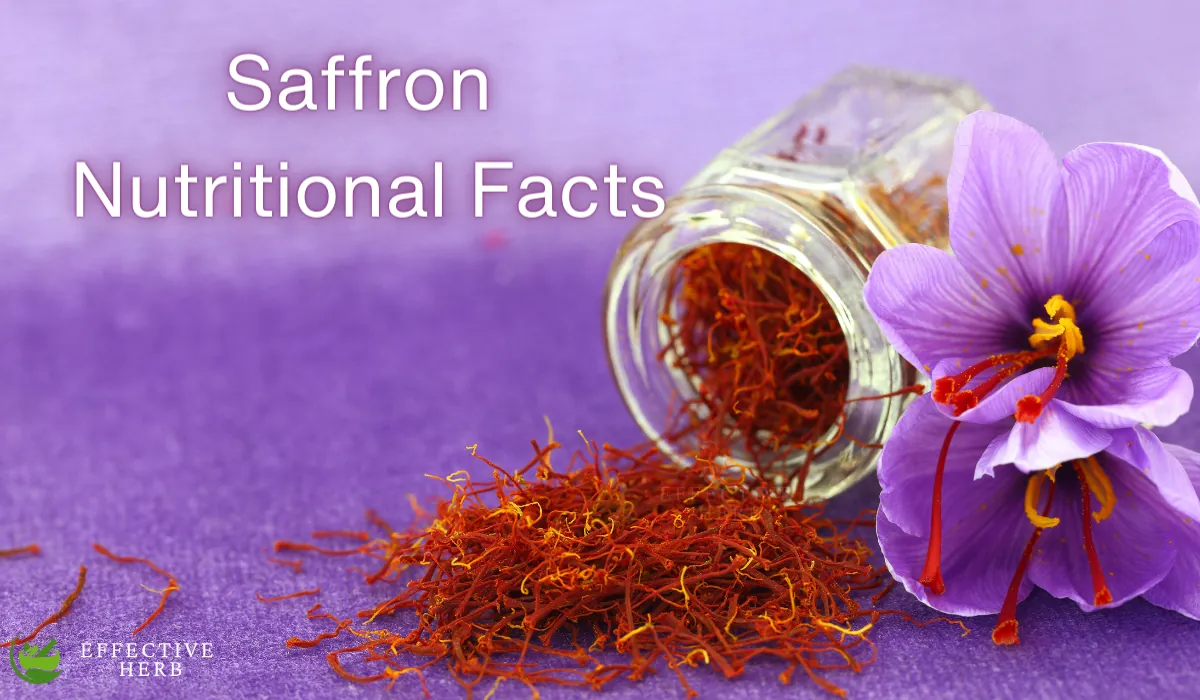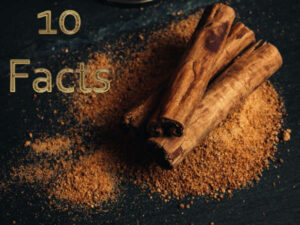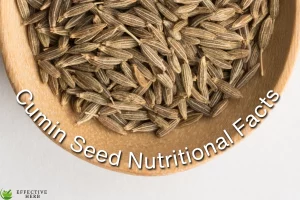Saffron Nutrition Facts
Delve into the nutrition facts of saffron in this blog post. Saffron is a prized spice known for its vibrant color, distinct flavor, and culinary uses. Beyond its culinary allure, saffron offers several health benefits and is a source of various nutrients.
Full Nutrient Table
The below nutrition table is based on a 100-gram portion of saffron. This spice is low in calories but rich in essential nutrients like manganese, vitamin C, and iron. Saffron also contains antioxidants and has potential anti-inflammatory properties. Incorporating saffron into your dishes not only enhances their flavor and appearance but also adds nutritional value.
| Name | amount | Unit |
|---|---|---|
| Proximates | ||
| Water | 11.9 | g |
| Energy | 310 | kcal |
| Energy | 1300 | kJ |
| Protein | 11.4 | g |
| Total lipid (fat) | 5.85 | g |
| Ash | 5.45 | g |
| Carbohydrates | ||
| Carbohydrate, by difference | 65.4 | g |
| Fiber, total dietary | 3.9 | g |
| Minerals | ||
| Calcium, Ca | 111 | mg |
| Iron, Fe | 11.1 | mg |
| Magnesium, Mg | 264 | mg |
| Phosphorus, P | 252 | mg |
| Potassium, K | 1720 | mg |
| Sodium, Na | 148 | mg |
| Zinc, Zn | 1.09 | mg |
| Copper, Cu | 0.328 | mg |
| Manganese, Mn | 28.4 | mg |
| Selenium, Se | 5.6 | µg |
| Vitamins and Other Components | ||
| Vitamin C, total ascorbic acid | 80.8 | mg |
| Thiamin | 0.115 | mg |
| Riboflavin | 0.267 | mg |
| Niacin | 1.46 | mg |
| Vitamin B-6 | 1.01 | mg |
| Folate, total | 93 | µg |
| Folic acid | 0 | µg |
| Folate, food | 93 | µg |
| Folate, DFE | 93 | µg |
| Vitamin B-12 | 0 | µg |
| Vitamin A, RAE | 27 | µg |
| Retinol | 0 | µg |
| Vitamin A, IU | 530 | IU |
| Vitamin D (D2 + D3), International Units | 0 | IU |
| Vitamin D (D2 + D3) | 0 | µg |
| Lipids | ||
| Fatty acids, total saturated | 1.59 | g |
| SFA 4:0 | 0 | g |
| SFA 6:0 | 0 | g |
| SFA 8:0 | 0 | g |
| SFA 10:0 | 0 | g |
| SFA 12:0 | 0 | g |
| SFA 14:0 | 0.006 | g |
| SFA 16:0 | 1.16 | g |
| SFA 18:0 | 0.247 | g |
| Fatty acids, total monounsaturated | 0.429 | g |
| MUFA 16:1 | 0.003 | g |
| MUFA 18:1 | 0.39 | g |
| MUFA 20:1 | 0.006 | g |
| MUFA 22:1 | 0 | g |
| Fatty acids, total polyunsaturated | 2.07 | g |
| PUFA 18:2 | 0.754 | g |
| PUFA 18:3 | 1.24 | g |
| PUFA 18:4 | 0 | g |
| PUFA 20:4 | 0.013 | g |
| PUFA 2:5 n-3 (EPA) | 0 | g |
| PUFA 22:5 n-3 (DPA) | 0.006 | g |
| PUFA 22:6 n-3 (DHA) | 0 | g |
| Fatty acids, total trans | 0 | g |
| Cholesterol | 0 | mg |
| Amino acids | ||
| Alcohol, ethyl | 0 | g |
| Caffeine | 0 | mg |
| Theobromine | 0 | mg |
| Name | amount | Unit |
Nutritional Charts for saffron
Nutrient Composition Pie Chart
Saffron is a spice known for its vibrant color and unique flavor. But did you know that it also provides a range of essential nutrients? This chart shows the proportion of different macronutrients (protein, fat, carbohydrate) and micronutrients (vitamins and minerals) in saffron. With 11.9g of water, 310kcal of energy, and 65.4g of carbohydrates, saffron is a hydrating and energy-rich ingredient. It also contains 11.4g of protein, 5.85g of fat, and 5.45g of ash, which contribute to its nutritional value. Additionally, saffron provides important minerals like calcium (111mg), iron (11.1mg), and magnesium (264mg), as well as vitamins such as vitamin C (80.8mg) and vitamin A (27µg). Including saffron in your diet can help you meet your nutritional needs while adding a burst of flavor to your dishes.
Conclusion
Saffron is a multifaceted spice that not only enhances the taste and appearance of food but also offers an array of nutritional benefits. Its impressive antioxidant profile and potential health-enhancing properties make it a valuable addition to a healthy diet. To learn more about the nutrient content of saffron, consider visiting this Source.







